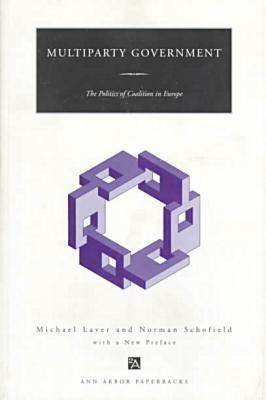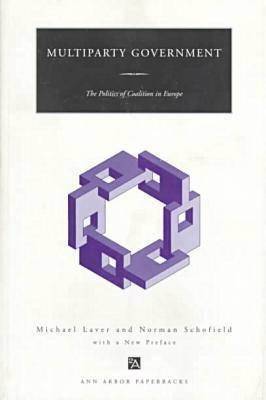
- Retrait gratuit dans votre magasin Club
- 7.000.000 titres dans notre catalogue
- Payer en toute sécurité
- Toujours un magasin près de chez vous
- Retrait gratuit dans votre magasin Club
- 7.000.0000 titres dans notre catalogue
- Payer en toute sécurité
- Toujours un magasin près de chez vous
37,45 €
+ 74 points
Description
The politics of coalition--the very heart of the political process in most European countries--can be analyzed either theoretically or empirically. Multiparty Government reconciles these approaches. It gives students of European politics access to the insights of contemporary theory while applying it to an analysis of real-world coalition politics.
Michael Laver and Norman Schofield examine five basic themes: the identity and motivation of the actors in the coalition game; the eventual membership of the coalitions they form; their durability; the payoffs that are shared out by coalition members; and the impact of constitutional bargaining, behavioral, and historical constraints on the process of coalition bargaining. They illustrate their discussion of theory with a range of detailed case studies.
Multiparty Government offers an accessible approach that bridges the gap between the "European politics" and "game theory" traditions of political science, and puts the systematic study of the politics of coalition on the broader political science map.
"Laver and Schofield's book is at the same time accessible, pithy, down-to-earth, insightful, and yes, even captivating. In its scope and quality, it has no rival in the literature of party coalitions . . . all students of political parties or legislative behavior should allow themselves the privilege of being educated and entertained by Laver and Schofield's fine book." --American Political Science Review
Michael Laver is Professor of Political Science and Sociology, University College, Galway. His books include Playing Politics; Private Desires, Political Action: An Invitation to the Politics of Rational Choice; The Crime Game; and Social Choice and Public Policy. Norman Schofield is Professor and Director, Center in Political Economy, Washington University. He is the author of Statistics: Theory & Practice in the Social Sciences; Mathematical Methods in Economics; and Social Choice and Democracy.
Michael Laver and Norman Schofield examine five basic themes: the identity and motivation of the actors in the coalition game; the eventual membership of the coalitions they form; their durability; the payoffs that are shared out by coalition members; and the impact of constitutional bargaining, behavioral, and historical constraints on the process of coalition bargaining. They illustrate their discussion of theory with a range of detailed case studies.
Multiparty Government offers an accessible approach that bridges the gap between the "European politics" and "game theory" traditions of political science, and puts the systematic study of the politics of coalition on the broader political science map.
"Laver and Schofield's book is at the same time accessible, pithy, down-to-earth, insightful, and yes, even captivating. In its scope and quality, it has no rival in the literature of party coalitions . . . all students of political parties or legislative behavior should allow themselves the privilege of being educated and entertained by Laver and Schofield's fine book." --American Political Science Review
Michael Laver is Professor of Political Science and Sociology, University College, Galway. His books include Playing Politics; Private Desires, Political Action: An Invitation to the Politics of Rational Choice; The Crime Game; and Social Choice and Public Policy. Norman Schofield is Professor and Director, Center in Political Economy, Washington University. He is the author of Statistics: Theory & Practice in the Social Sciences; Mathematical Methods in Economics; and Social Choice and Democracy.
Spécifications
Parties prenantes
- Auteur(s) :
- Editeur:
Contenu
- Nombre de pages :
- 328
- Langue:
- Anglais
- Collection :
Caractéristiques
- EAN:
- 9780472085620
- Date de parution :
- 28-08-98
- Format:
- Livre broché
- Format numérique:
- Trade paperback (VS)
- Dimensions :
- 146 mm x 232 mm
- Poids :
- 467 g

Les avis
Nous publions uniquement les avis qui respectent les conditions requises. Consultez nos conditions pour les avis.






